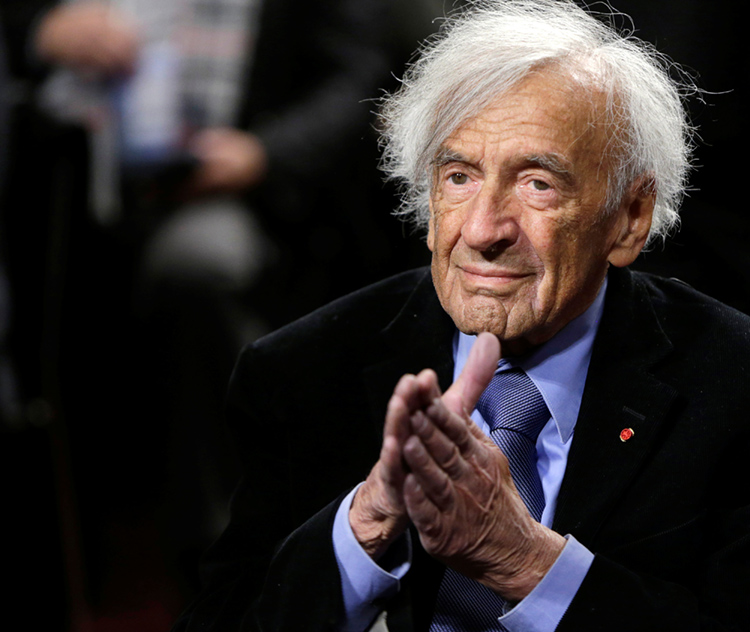Current Events Lesson Plan: June 23-July 6, 2016
Current Event: Elie Wiesel (1928-2016)
On Saturday, July 2, Romanian-American author Elie Wiesel died at the age of 87. Wiesel became a leading spokesman for people who survived Nazi concentration camps during World War II (1939-1945), and he dedicated his life to describing the horrors he witnessed and to helping victims of oppression and racism. Eliezer Wiesel was born on Sept. 30, 1928, in Sighet, Romania. In 1944, he was sent with his family and the town’s other Jews to a camp at Auschwitz (now Oswiecim), Poland, near Krakow. He was later sent to a camp at Buchenwald, Germany, near Weimar. Wiesel’s parents and a sister died at these camps. After Buchenwald was liberated in 1945, Wiesel settled in France. In 1976, Wiesel became a professor of humanities at Boston University. President Jimmy Carter appointed him chairman of the President’s Commission on the Holocaust in 1979. In 1980, Wiesel was named head of the United States Holocaust Memorial Council. Wiesel’s humanitarian efforts earned him the 1986 Nobel Peace Prize. Wiesel wrote more than 35 books. His first book, Night (1958, revised edition 2006), is a memoir of his experiences in Nazi concentration camps.

Nobel Peace Laureate Elie Wiesel, seen here in 2015, died on July 2, 2016. Credit: © Gary Cameron, Reuters
Objective:
The Holocaust was the systematic, state-sponsored murder of Jews and others by the Nazis during World War II. The Nazi dictator Adolf Hitler wanted to eliminate all Jews as part of his aim to conquer the world. By the end of the war, the Nazis had killed about 6 million Jewish men, women, and children—more than two-thirds of the Jews in Europe. In addition to Jews, the Nazis systematically killed millions of other people whom Hitler regarded as racially inferior or politically dangerous. Historians estimate that perhaps as many as 11 million people were killed in total. Many of the Holocaust victims were killed in specially constructed gas chambers, and their bodies were then burned. The word holocaust comes from a Greek word that means a sacrificial offering that is completely burned. The Behind the Headlines news story and related World Book articles explore the Holocaust.
Words to know:
- Auschwitz
- Concentration camp
- Final Solution
- Adolf Hitler
- Holocaust
- Nazism
- Night
- Nobel Prizes
- Elie Wiesel
- World War II
Discussion Topics:
1. Elie Wiesel won the Nobel Peace Prize in 1986. Ask your students to name some other well-known Nobel Prize winners. (Students might say Winston Churchill; Marie Curie; Albert Einstein; Alexander Fleming; Ernest Hemingway; Martin Luther King, Jr.; Nelson Mandela; Barack Obama; Theodore Roosevelt; Mother Teresa; Desmond Tutu.)
2. Ask your students to name military and political leaders of World War II. (Students might say Winston Churchill, Charles De Gaulle, Dwight Eisenhower, Hirohito, Adolf Hitler, Douglas MacArthur, Benito Mussolini, George Patton, Erwin Rommel, Franklin Roosevelt, Joseph Stalin.)
3. During World War II, the Allies found out about Auschwitz and the Holocaust. Some people called for the Allies to bomb Auschwitz and other concentration camps, claiming that by destroying the concentration camps fewer people would be killed in the Holocaust. Other people argued that bombing Auschwitz would divert resources needed to win the war as quickly as possible, and some people believed that bombing Auschwitz would have made the Allies guilty of the deaths of the prisoners they would have inevitably killed. The Allies decided to not bomb Auschwitz. Ask your students to debate: “The Allies should have bombed Auschwitz during World War II.”
4. Ask your students to use World Book’s Timelines feature to view or add to the Holocaust timeline. (Students may wish to use World Book’s “Holocaust” article for help.)


